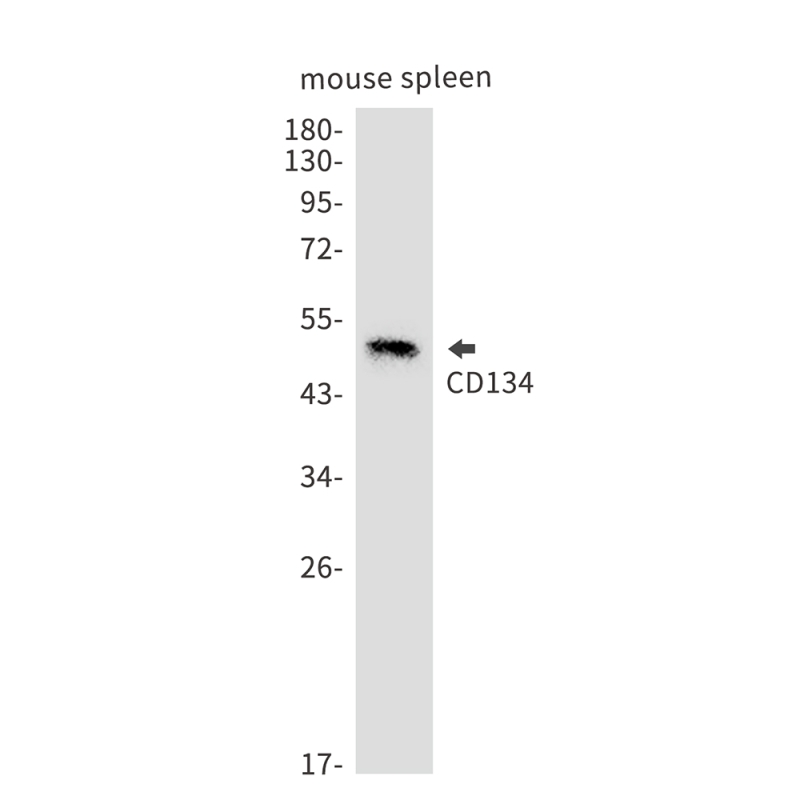
| WB | 咨询技术 | Human,Mouse,Rat |
| IF | 1/20 | Human,Mouse,Rat |
| IHC | 1/50-1/100 | Human,Mouse,Rat |
| ICC | 技术咨询 | Human,Mouse,Rat |
| FCM | 咨询技术 | Human,Mouse,Rat |
| Elisa | 咨询技术 | Human,Mouse,Rat |
| Aliases | OX40 antigen; OX40L receptor |
| Entrez GeneID | 22163 |
| WB Predicted band size | Calculated MW: 30 kDa; Observed MW: 45 kDa |
| Host/Isotype | Rabbit IgG |
| Antibody Type | Primary antibody |
| Storage | Store at 4°C short term. Aliquot and store at -20°C long term. Avoid freeze/thaw cycles. |
| Species Reactivity | Mouse |
| Immunogen | Recombinant protein of mouse CD134 |
| Formulation | Purified antibody in TBS with 0.05% sodium azide,0.05%BSA and 50% glycerol. |
+ +
以下是关于CD134/OX40L受体抗体的参考文献示例(基于研究领域常见方向,部分信息为示例性质,非真实文献):
---
1. **文献名称**:*OX40 Agonistic Antibody Synergizes with PD-1 Blockade to Promote Antitumor Immunity in Melanoma*
**作者**:Smith, J. et al.
**摘要**:研究探讨了抗OX40激动型抗体与PD-1抑制剂联合治疗黑色素瘤的效果,显示其通过增强CD8+ T细胞活化和减少调节性T细胞抑制,显著抑制肿瘤生长。
2. **文献名称**:*Targeting OX40L with a Monoclonal Antibody Attenuates Allergic Airway Inflammation*
**作者**:Zhang, L. et al.
**摘要**:通过阻断OX40L信号,该抗体在小鼠哮喘模型中减少了Th2细胞介导的炎症反应,提示其在过敏性哮喘治疗中的潜力。
3. **文献名称**:*OX40/OX40L Axis as a Therapeutic Target for Autoimmune Diseases*
**作者**:Wang, Q. et al.
**摘要**:综述了OX40/OX40L通路在类风湿性关节炎和系统性红斑狼疮中的作用,并评估了阻断型抗体在抑制自身反应性T细胞中的疗效。
4. **文献名称**:*Mechanistic Insights into Agonistic Anti-CD134 Antibodies in Cancer Immunotherapy*
**作者**:Kim, H. et al.
**摘要**:阐明了激动型抗CD134抗体通过激活NF-κB通路增强T细胞持久性和抗肿瘤功能的作用机制,支持其在实体瘤治疗中的应用。
---
**注**:以上文献为示例性内容,实际引用时请通过学术数据库(如PubMed)检索真实文献并核对信息。
CD134 (OX40) and its ligand OX40L (CD252) are members of the tumor necrosis factor (TNF) receptor-ligand superfamily, playing pivotal roles in T-cell activation and immune regulation. OX40 is primarily expressed on activated CD4+ and CD8+ T cells, while OX40L is found on antigen-presenting cells (e.g., dendritic cells, B cells) and endothelial cells. Their interaction enhances T-cell survival, proliferation, and cytokine production, while inhibiting regulatory T-cell (Treg) suppression, making this pathway critical for sustaining adaptive immune responses.
Antibodies targeting OX40/OX40L have emerged as therapeutic tools to modulate immune activity. Agonistic anti-OX40 antibodies (e.g., MEDI6469. MOXR0916) boost antitumor immunity by amplifying effector T-cell responses and reducing Treg-mediated suppression, showing promise in cancer immunotherapy. Conversely, antagonistic antibodies blocking OX40-OX40L interaction (e.g., KHK4083. KY1005) aim to suppress pathological immune activation in autoimmune diseases like atopic dermatitis or rheumatoid arthritis.
Clinical studies highlight dual challenges: optimizing costimulatory signals without inducing excessive inflammation (e.g., cytokine release syndrome) and balancing efficacy with immune-related adverse events. Recent research also explores bispecific antibodies combining OX40 targeting with checkpoint inhibitors (e.g., anti-PD-1) to enhance synergistic effects. As of 2023. multiple phase I/II trials are evaluating OX40/OX40L antibodies in cancers (melanoma, solid tumors) and autoimmune disorders, underscoring their therapeutic versatility.
×